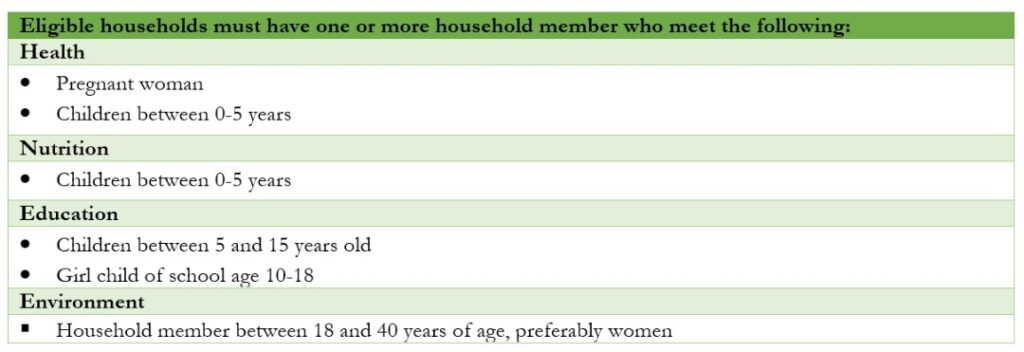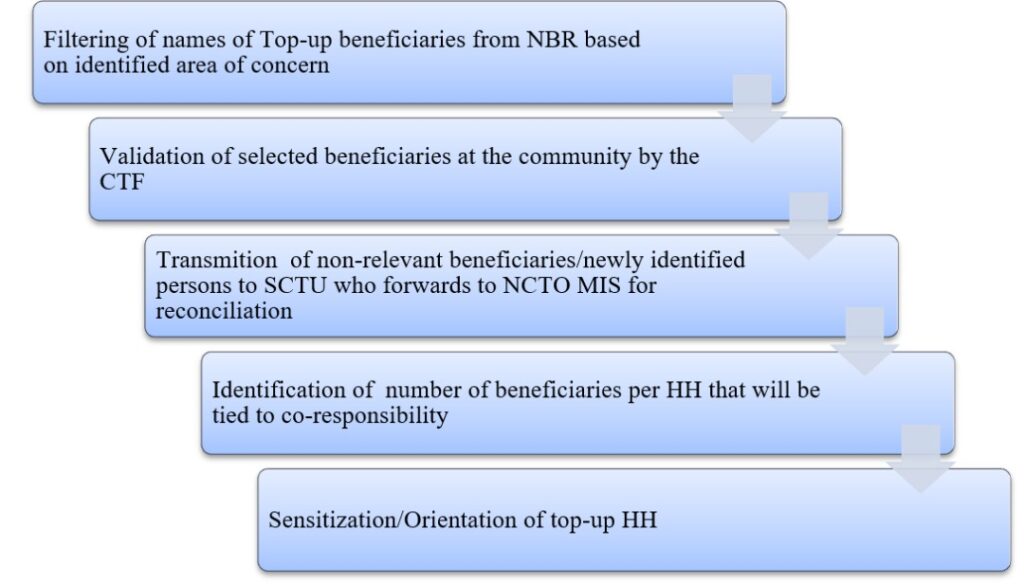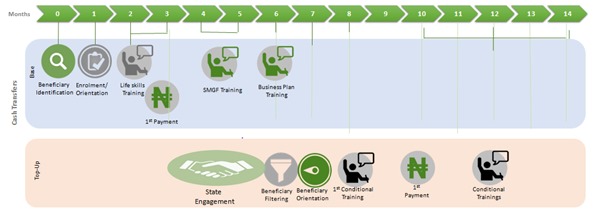Targeting Criteria and Eligibility Requirements for the selection of Top-Up Transfer beneficiaries
Households eligible for Top-up are filtered from the CCT beneficiaries based on the area of concern selected by each state. HH data that are more than two years old shall be subjected to review processes to be developed to ascertain their eligibility and a fresh identification process shall be conducted to determine those that are eligible. The criteria for eligibility are listed below.
Household eligibility criteria

Beneficiaries households that meet the conditions required will receive an additional top up of 5,000 naira monthly. Payments will be made on a bi-monthly (every two months) basis. The identification process is listed below
Enrollment steps for Top-up Beneficiaries

CO-RESPONSIBILITIES PROCESSES
Cash transfers alone cannot address the challenges and root causes of poverty, malnutrition, income poverty and poor human capital development, therefore beneficiaries shall be required to fulfill certain co-responsibilities as part of efforts to address the identified challenges.
Basic Training
As part of the co-responsibilities expected to be fulfilled by beneficiary households, caregivers or alternates are required to attend basic trainings with exception of the invalid; these trainings are expected to build their capacities for enhanced quality of life. After beneficiaries have been enrolled, sensitized on the aims and objectives of the Programme, the basic trainings shall commence one after the other.
Two training themes have been identified for delivery under basic trainings and listed below. The contents have been developed as outlined in appendix 2B and 2C which shall be translated into three major Nigerian languages.
The basic trainings shall commence a week after beneficiaries’ enrollment and will be spread over the period of first 6 months of the programme. The basic trainings delivery shall commence with the Life Skills training, to be followed up with Savings Group Mobilization and Micro business skills training (SGMMB). The first payment to beneficiaries will be made second month after commencement of the basic training.
For all trainings, a pool of master trainers has been established. The master trainers are selected from among staff of NCTO, SCTUs and NGOs, trained at the national level through Training of Trainers (ToT). They shall step down the trainings to the CTFs at state level. Refresher trainings shall be conducted as the need arises to enhance beneficiaries’ performance.
Once the SGMMB training is concluded, beneficiaries will be encouraged to form savings groups and start savings within six months after the commencement of the training delivery. It is expected that the groups will metamorphose into cooperative societies and be linked to sources of credit and/or Deposit Money Banks. In a situation where groups are not formed within a given period of six months, moral-suasion and peer pressure shall be adopted to encourage compliance.
Training and Services for Top-up transfer
A national framework for the co-responsibilities, reflecting key national priorities and desired outcomes in the areas of human capital formation and sustainable development has been developed. A menu of co-responsibilities has been developed around health, nutrition, education and environment as shown in table 6 below. The co-responsibilities have two components which are soft and hard. Each of the hard co-responsibilities has a corresponding soft co-responsibility that precedes the implementation of the co-responsibilities. The soft component consists of workshops, trainings and seminars on nutrition while the hard component consists of other activities beneficiaries are expected to carry out. The workshops which are prelude to the hard co-responsibilities compliance are aimed at creating awareness and sensitization to encourage behavioral change.
The states (irrespective of area of concern chosen) shall commence with “softer” co-responsibilities or accompanying measures such as awareness seminars and training sessions on nutrition. This shall be followed by orientation session on the specific area of concern selected by the state to enable commence the hard co-responsibility. While the soft training is going on, the supply side gap issues are expected to be addressed by the states. As the participating states improve both supply side and programme management capacity, hard co-responsibilities are expected to evolve over the life of the programme to include more activities related to utilization of health and education services (i.e. utilization of health centers, primary school enrolment and attendance, girls’ junior secondary school attendance). See figure 4 below for scheduling.
Illustration of Cash Transfer Programme Schedule

